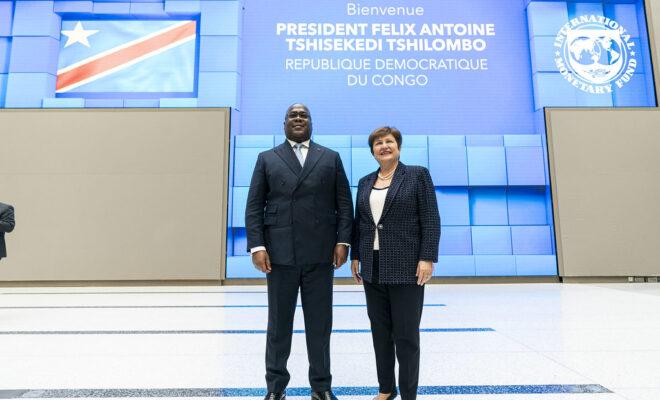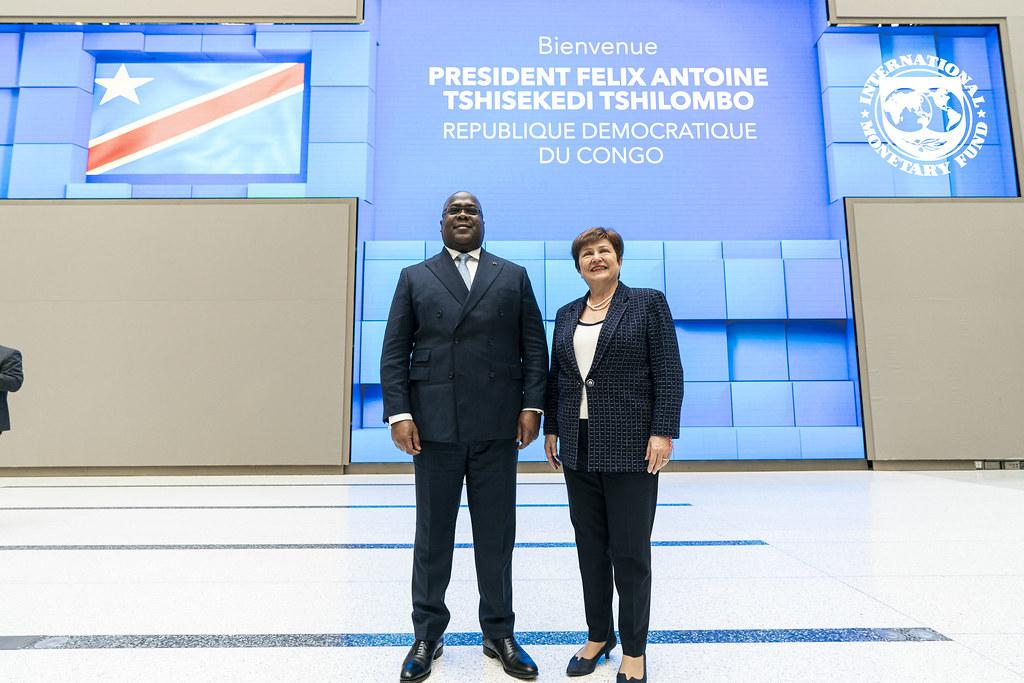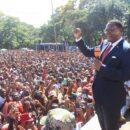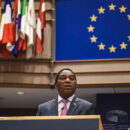DRC: What now that President Tshisekedi has taken control?

Tshisekedi has liberated himself from his rivals, but it remains to be seen if this will be a victory for the country or just his political camp.

President Felix Tshisekedi of the DRC in Washington, DC, in March 2020. Credit: IMF/Joshua Roberts.
There aren’t many people who will end 2020 feeling that it’s been a good year. President Felix Tshisekedi of the Democratic Republic of Congo (DRC) looks set to be an exception. He will end the year having overcome his two closest political rivals: former President Joseph Kabila; and Vital Kamerhe, his own chief of staff and the leader of the Union Nationale pour le Congo (UNC), the partner of his Cap pour le Changement (CACH) political platform.
Tshisekedi was not only in coalition with both men and their respective political parties, but he had also made agreements with them that he would stand aside in the 2023 elections. Now Kamerhe is in prison, sentenced to 20 years for his role in a corruption scandal. Meanwhile, Kabila is on the ropes fighting to keep his Front Commun pour le Congo (FCC) political platform intact and politically relevant.
How Tshisekedi took control
Since the start of this year, President Tshisekedi has made several bold interventions that have gone to the heart of Kabila’s political and military network. This includes removing Albert Yuma, the powerful head of the state-owned copper and cobalt mining giant Gecamines, and suspending Delphin Kahimbi, the controversial chief of military intelligence in February.
The FCC camp responded with shock to these moves. They accused the president of overstepping his constitutional limits and attempted, in vain, to lobby the international community to rein him in. The FCC and Kabila appear to have underestimated Tshisekedi’s political ambitions and naively believed he would stick to their original deal.
In October, Tshisekedi dealt the FCC camp another substantial blow, appointing three new judges to the constitutional court. That institution had been a pillar of Kabila’s power. For decades, it had written judgements in support of whatever political rearrangement the former president wanted to make – including justifying the two-year delay in holding elections and approving the government’s official elections results in 2018.
By losing control of the constitutional court, Kabila lost the ability to manipulate elections and, with it, the ability to guarantee his followers that the FCC will be back in power in 2023. This promise had been central to holding the political platform together. Now Kabila can no longer keep it, the coalition’s parties have started to drift.
This is the context in which Tshisekedi held his three-week national consultations in November. He met with key opposition figures such as Moise Katumbi and Jean Pierre Bemba as well as the Catholic Church, civil society, traditional leaders, business leaders and provincial governors. The FCC boycotted the consultations, arguing that it would only engage in discussion with the president within the framework of the coalition agreement.
On 6 December, Tshisekedi gave a report to the nation outlining the subjects discussed and a list of priorities for the country. In this speech, he made the bombshell announcement that he was ending the ruling coalition between his platform CACH and Kabila’s FCC. He said the drastic move is necessary because the coalition has broken down, citing the example of the FCC’s boycott of the inauguration of three new constitutional courts judges.
At the heart of Tshisekedi’s latest moves is a desire to shift power in the National Assembly. In his address, he also said the FCC’s majority of 338 had crumbled and that he would be appointing someone to form a new majority. This prompted questions as to whether he has the power to do this. Article 78 of the constitution allows the president to nominate someone to form a majority in parliament, but constitutional experts argue this clause refers to a context in which a recent election delivers no clear majority.
Tshisekedi seems to have anticipated this constitutional dilemma as well. In November, over 200 MPs signed a petition calling for the leadership of the national assembly to resign on the grounds that it improperly handled parliamentary financial matters. While the charges are rather flimsy, they provided Tshisekedi and his supporters with the battering ram they needed to start chipping away at the FCC majority. On 10 December, 283 of 483 MPs present moved in support of the petition, leading to the removal of the Jeanine Mabunda, the FCC President of the National Assembly, and the rest of her bureau.
Given that non-FCC parties hold only 162 seats, it is clear that some FCC MPs voted against their own party. Tshisekedi’s supporters argue that this fact proves the president’s assertion that the FCC majority has crumbled, allowing him to legitimately make the argument that a new majority must be identified.
A brighter future?
The agreement made between Kabila and Tshisekedi in January 2019 clearly never superseded the two men’s political affiliations or led to a government focused on governing the country. The question is whether a new majority will be any less self-serving.
With the way now open for the formation of a new parliamentary majority and the appointment of a new prime minister and government, it is essential for the future of the DRC that this goes beyond a victory of one political camp over another. Tshisekedi must now show that his ambition is to put the country on the path of good governance, with independent institutions that will work for the people.
The road ahead will be bumpy. Tshisekedi has to negotiate a power-sharing arrangement with new political partners, most of whom have their own political and even presidential ambitions. He has to reign in his own supporters whose inclination is to see this as an opportunity to have more power. Inevitably, a period of hectic political horse trading lies ahead. How Tshisekedi manages that and what tone he sets will be vital in determining whether this is the beginning of a fundamental shift away from the status quo of political rivalries, poor governance, corruption and patronage.
The DRC’s new leadership – which will likely include Bemba and Katumbi, and which should also bring in Martin Fayulu, the actual winner of the 2018 presidential election – has the chance to fundamentally change the future of the DRC. It could shift the focus away from elite power politics to credible and accountable governance, complete with free and fair elections in 2023.
Given the chance to vote freely and fairly, the Congolese people – who have amply demonstrated that they want an end to the Kabila era and desperately need their political leaders to focus on economic development, basic services, and the restoration of stability in the east – will reward those leaders who deliver a better future.






